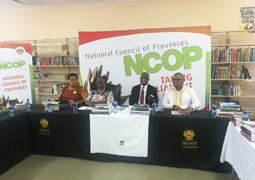
When the NCOP delegation visited Orlando High School during the Taking Parliament to the People in 2018, it decried the poor state of the school’s library which had a meagre book. Today, the NCOP donated 600 books to the school.
The delegation made a commitment to do something to improve the condition and stock of the library in the interest of advancing the culture of teaching and learning.
As promised, when the NCOP came back it donated over 600 hundred different books on a wide range of fields to boost the inventory of the library stock.
In his opening remarks, the Chairperson of the NCOP, Mr Amos Masondo, gave a historical context of the school.
According him, the school is known for producing soccer luminaries such as Jomo Sono and Kaizer Motaung. “There is a direct link between Orlando High School and Orlando Pirate Foot Ball Club,” he said.
Mr Masondo also stated that the school has a good academic history and commended its legacy of developing black intelligentsia in South Africa.
“Dr Thamsanqa Kambule, a well-known black mathematician studied at the school. These black intellectuals would never be who they are if they were not avid readers,” he added.
Giving context to the business of the day, Mr Masondo stated that, what brought the NCOP back to the school was to deliver the donation of the books to the school library, the fulfilment of the commitment it made in 2018.
In giving the books, Mr Masondo said: “This underscores the fact that knowledge is power, and is a key to our existence and development as human beings.”
He further stated that one should ask “what book am I reading now as we speak, if not, there is something wrong with you.” Or one should ask him/herself when last “have I seen a theatrical production which are all the product reading and writing”.
He said, in his opinion, books speak “to the level of culture and civilisation of a given nation or community. If you are living in a society that is not involved in the production of the arts it is bad”.
He urged young people to be engaged in theatre and poetry as those are fundamental pillars of knowledge related to the production of books.
He said, through the donation of the books to the library, the NCOP, intends to deepen the culture of reading and learning in the school. Adding, that among other things, people read books to broaden “one’s understanding, to expand one’s vocabulary and to improve one’s writing skills”.
“We urge the students to read the books and we appeal to the school principal to write to book stores and ask them to donate books to the school library,” he added.
Also speaking during the handing over of the donation to Orlando High School, the House Chairperson of the NCOP, Ms Winnie Ngwenya said: “The NCOP will ensure that it prioritises the advancement of the school libraries because they are the epicentre of the culture of teaching and learning.”
Responding to the NCOP’s donation, the Ward Councillor, Mr Bongani Dlamini, said they are glad that Orlando High will, through the donation, be involved in the development of the community.
“The message communicated here today is everlasting and will continue to enrich the fountain of the culture of teaching and learning at the school,” he said.
The Head of the Department of Languages, Mr Bongani Ntombela, stated that “as educators they are grateful for the donation and they will use the books to improve learner’s writing skills and their comprehension of languages.
The Chairperson of the school’s Student Representative Council (SRC), Ms Khanyisa Nkuna, commended the NCOP for the donation of the books, but was quick to point out that, it would be much nicer to have a more advanced library with all the necessary facilities that are a feature of a well-functioning library.
She said: “It saddens us that the school is not well developed, given its history and the people it produced during the course of its history.”
By Abel Mputing

